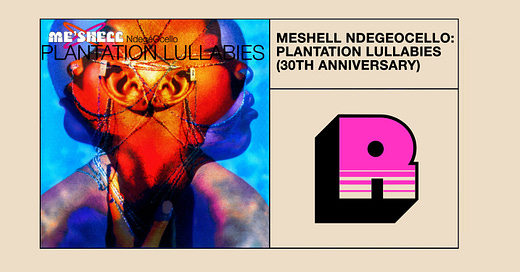
Retrospective Review: Plantation Lullabies by Meshell Ndegeocello
Meshell Ndegeocello was ahead of her time with her 1993 debut.
Over the course of three decades, Meshell Ndegeocello has cemented her place in the music industry with an array of unforgettable compositions that offer a multitude of ways to connect with her art. In her most recent project, The Omnichord Real Book, she crafts Afro-futuristic funk under the Blue Note Records label. Meanwhile, her previous works offer a minimalist folk soul twist to familiar ‘80s urban radio melodies, and others deliver delicate equilibrium between reflective thought and spirit.
Yet, to fully appreciate Ndegeocello's expansive career, one should look back to where it originated: her groundbreaking debut, Plantation Lullabies. From childhood, she had an affinity for the bass guitar, honing her talents in the lively go-go scene of Washington, DC. Her unique and unorthodox style initially met with resistance within the industry. After giving birth to her son in 1989, she remained relentless, shopping her music to various labels for two arduous years. Her steadfast efforts eventually bore fruit when Maverick Records, a Warner-distributed label owned by Madonna, decided to bring her on board.
Ndegeocello embodied the concept of intersectionality long before it became a widely used term. Her debut album is a bold fusion of hip-hop, soul, and jazz, infused with queer sexual identity, androgynous femininity, and unapologetic Blackness. Any attempt to oversimplify this complex work would risk losing its depth. She and Scritti Politti-alumnus David Gamson handled most of the production, with contributions from Bob Power and Andre Betts, with DJ Premier even lending his scratch skills on “Two Lonely Hearts (On the Subway).”
Her voice, whether rapping or singing, exudes a soothing, velvety strength—soft to the touch yet resilient, even when heightened to emphasize a point. Her skilled bass playing, though she didn’t study Larry Graham’s style until later in her career, can be commanding when needed. Like a naughty child on a sugar high causing a commotion in economy class, Ndegeocello’s music demands attention and leaves a lasting impression.
The album is a musical masterpiece that seamlessly blends many stylistic layers. The bass foundations provide a solid backbone for the jazz piano motifs, while the drum beats defy jazz norms by striking hard. The hip-hop loops are expertly contrasted with live drum patterns, creating a unique sound. The beat poet rap is artfully subdued by soulful vocal embellishments, resulting in a harmonious blend of musical components that are nearly indistinct.
But it’s not just the music that invites scrutiny—the lyrics are equally thought-provoking. The album offers critical observations on the state of Black America while also reveling in sensual exuberance. Amidst the darker themes, glimmers of romantic optimism breakthrough, providing the source material for the album’s singles.
The opening track, “Dred Loc,” may seem subdued, but it’s a bold declaration. The music video portrays the artist’s non-binary sexuality and androgyny, featuring an intimate shaving scene with a male partner. This rejection of neatly defined sexual identity elicited mixed reactions within the LGBTQ+ community, making it an influential and controversial statement.
The aggressively forthright qualities of “If That’s Your Boyfriend (He Wasn’t Last Night)” don’t manifest as a novel concept, but the track’s funk-infused hip-hop retaliations are decidedly potent. The subsequent release, “Outside Your Door,” was a revelatory tune exposing a sensual underbelly. The interplay between the pulsating rhythms and the evocative piano melodies lingers, persisting well beyond the witching hour.
Interestingly, these same piano motifs were conspicuously featured in Brian McKnight’s “Anytime” without even a fleeting acknowledgment. McKnight’s spokesperson dismissively waved off similarities, arguing that “Anytime” predated Meshell Ndegeocello’s recording contract. Yet, curiously, the copyright for “Outside Your Door” precedes it by a total four-year margin. One can’t help but ponder if the debt will be settled, not in money but cosmic retribution.
Plantation Lullabies dissects Black love, albeit with intricate complexities. The poetic overture of “Untitled” prefaces “Step Into the Projects,” which portrays romantic experiences colored by societal turmoil. Ndegeocello’s unique rapping style here is precision-incarnate—graceful, calculative, and strikingly reflective of Black culture.
A certain jubilance permeates the record. For instance, “Picture Show” beams with celebratory lines about theatrical nudity against an irresistibly quirky beat. While the U.S. promotional activities concluded with “Outside Your Door,” other global markets featured “Call Me” as a follow-up. The original track oozes with endearing verbal nectar, whereas a rare Daniel Abraham remix infuses it with an urban pulse.
On a graver note, Plantation Lullabies offers an incisive critique of Black America’s internal and external challenges. Nestled amidst soulful Motown references and fiery guitar riffs, “I’m Diggin’ You (Like an Old Soul Record)” retrospectively questions the net outcomes of the civil rights era. The incisive commentary in “Shoot’n Up and Gett’n High” compares cultural assimilation to a self-imposed drug—a way to fit into an unwelcoming society.
From this point, Ndegeocello scrutinizes miscegenation through an unfiltered Black feminine lens forcefully. “Soul on Ice” vehemently disputes mainstream Eurocentric beauty paradigms that overlook her magnetic presence and call out Black men who are complicit. Paradoxically, “Soul on Ice” is ablaze. Madonna’s endorsement of such a strikingly impactful body of work is hardly unexpected. Ndegeocello ingeniously prepares a rich melange of jazz, rap, and rock themes to tackle heavy subjects, making complex issues more palatable.
As for the legacy of Plantation Lullabies, Ndegeocello never felt the need to reproduce it. The subsequent wave of neo-soul artists, nurtured in the wake created by Plantation Lullabies, seemingly continued the work she started. They drew generously from a global Black musical heritage, combined it with sensuality, awareness, and individual expression themes, and succeeded without excessively kowtowing to commercial considerations.






This is SO WELL WRITTEN!! Her album is an absolute master class in the essentials for music of our culture: progressive compositions, thought provoking lyrics, and heartfelt delivery over showy tricks void of passion.
There are no skips. It's full of great music and has aged well.
Thanks for refreshing our memories about the great ones!